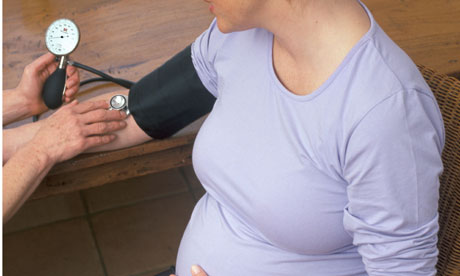
Pre-eclampsia, which only occurs in pregnancy, is a condition in which the blood pressure rises and excessive proteins leak into the urine. It causes fluid retention and is potentially life-threatening for the unborn baby and its mother. Full-blown eclampsia is very rare, but leads to seizures that can harm both mother and unborn baby.
What are the symptoms?
Usually pre-eclampsia starts in the second trimester, from 20 weeks onwards, and may be found without symptoms during routine blood pressure and urine testing. It is most common in the third trimester and, if the condition develops, can cause severe headaches, blurred vision (or light sensitivity), stomach ache, nausea and dizziness, and sudden weight gain. Women sometimes say they just feel really unwell.
What causes it?
The cause is not fully known, although generally, the condition is thought to be due to abnormalities of blood flow through the placenta that are fed back to the mother's body, which in turn responds by raising her blood pressure. A recent study in the journal Nature found that abnormalities in the regulation of proteins controlling the dilation and constriction of blood vessels (known as angiotensin) may be implicated – but it could not say if this abnormality can cause any symptoms of pre-eclampsia other than high blood pressure.
Risk factors include being under 20 or over 40 years of age, if this is a first pregnancy, if a woman has had the condition before, if she is carrying more than one baby, if she is obese, and if she has a medical condition already, such as diabetes, high blood pressure or kidney disease.
What's the treatment?
While you are pregnant, the treatment is to keep your blood pressure at a reasonable level with anti-hypertensive drugs. You may also be given magnesium sulphate to prevent seizures.
Are there complications?
Yes, and they're serious. The reduction of blood flow to the baby reduces its ability to thrive and grow, and may lead to low birth weight. There is a greater risk of the placenta coming away from the wall of the womb, and the onset of HELLP syndrome (the letters stand for haemolytic anaemia – when the blood vessels get broken up – elevated liver enzymes, and low platelets – the small cells that help clotting).
If pre-eclampsia is detected, you will usually be admitted to hospital and watched very closely. The good news is that most women go on to deliver perfectly healthy babies.
Can you prevent it?
Not really. Reducing salt has no effect, but resting for a few hours a day may help. Being regularly checked for blood pressure and protein in your urine is the best thing to do. If you have pre-eclampsia in your first pregnancy, you will have an increased risk the second time around and may want to talk to your doctor about it.

